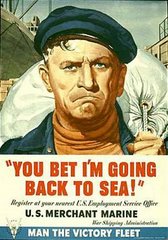 Anyone working in the maritime industry knows that there is a manning shortage that seems to be worsening. As someone currently working in the Tug and barge industry, I know there is an unquenchable need from companies to fill all billets, particularly mates. This shortage can be linked to several factors such as an aging current work force that is approaching retirement, the shift from crews made up of haws pipers and academy guys to boats with almost all academy guys for officers, stagnant pay for so many years, over regulation, and personal liability.
Anyone working in the maritime industry knows that there is a manning shortage that seems to be worsening. As someone currently working in the Tug and barge industry, I know there is an unquenchable need from companies to fill all billets, particularly mates. This shortage can be linked to several factors such as an aging current work force that is approaching retirement, the shift from crews made up of haws pipers and academy guys to boats with almost all academy guys for officers, stagnant pay for so many years, over regulation, and personal liability.
To illustrate the age gap, on the vessel which I am currently working on the person that is nearest to my age is 20 years older than me. Three of the eight are do to retire this year. This is not isolated to my boat, but out of all the ships and tugs I have sailed on, my observation has been that there is a missing generation within the industry. Talking to the guys on the boats they for the most part agree with that statement. The industry was slow during the 80s and part of the 90s and guys just got out of it. For a lot of people once you leave the industry you never want to get back into it.
The second contributor is the shift from a hawspiper/Academy mix to a primary Academy make-up for officers. With the shift in regulations and license requirements the Coast Guard has made it very difficult for guys to start on deck as an AB and move up through the ranks. This has resulted in the dependence on the academies to produce officers for the industry. The problem with this is that now the primary sources of officers have the credentials and background and are choosing to shift to a shore side position. In years past employees would shift around in the industry so there was never a real shortage. If a guy was working in New York Harbor he would just shift around in the harbor so the employee was never really going anywhere, they were still in the industry. This is not the issue now, I am finding that my friends and my self are thinking about or have already made the choice to move ashore. I guess what I am trying to say is that the demographics are changing to more college boys, and they have the credentials and the foresight to move to more favorable careers.
This comes to the last two points, which are probably the biggest isssues, the pay and the quality of life. First I will talk about the pay. It is a well-known fact that the pay has been stagnant for such a long time that, every year you stay in the industry you are making less than the prior year. Every time I look in the paper and I see that a principle of a middle school makes more than a captain of an ATB carrying millions of gallons/ dollars of product and equipment, the college educated workforce realizes this as well. Not to mention that the Captain is a moving target for a lawsuit and prosecution by false courts contrived by the Coast Guard-- there are no accidents, only negligence in this industry. Why would you want to stay in an industry that is so vilified whe

n you know that if there is any mishap that you are pretty much screwed? What job in the country has as much liability as the maritime business? That is something we starting out in the industry hear over and over again, “You are only good as your last job”
The industry as a whole is facing a huge problem and it is going to take everyone in all sectors of the industry to come together and let the government know what a vital role they play in the nation. It is critical that we lift regulations and red tape to attract people to come into the industry and end the constant fear of jail time, civil penalties, and losing your license to work. A rise in pay would help attract new people and bring back some people that may have left shipping for greener pastures.









